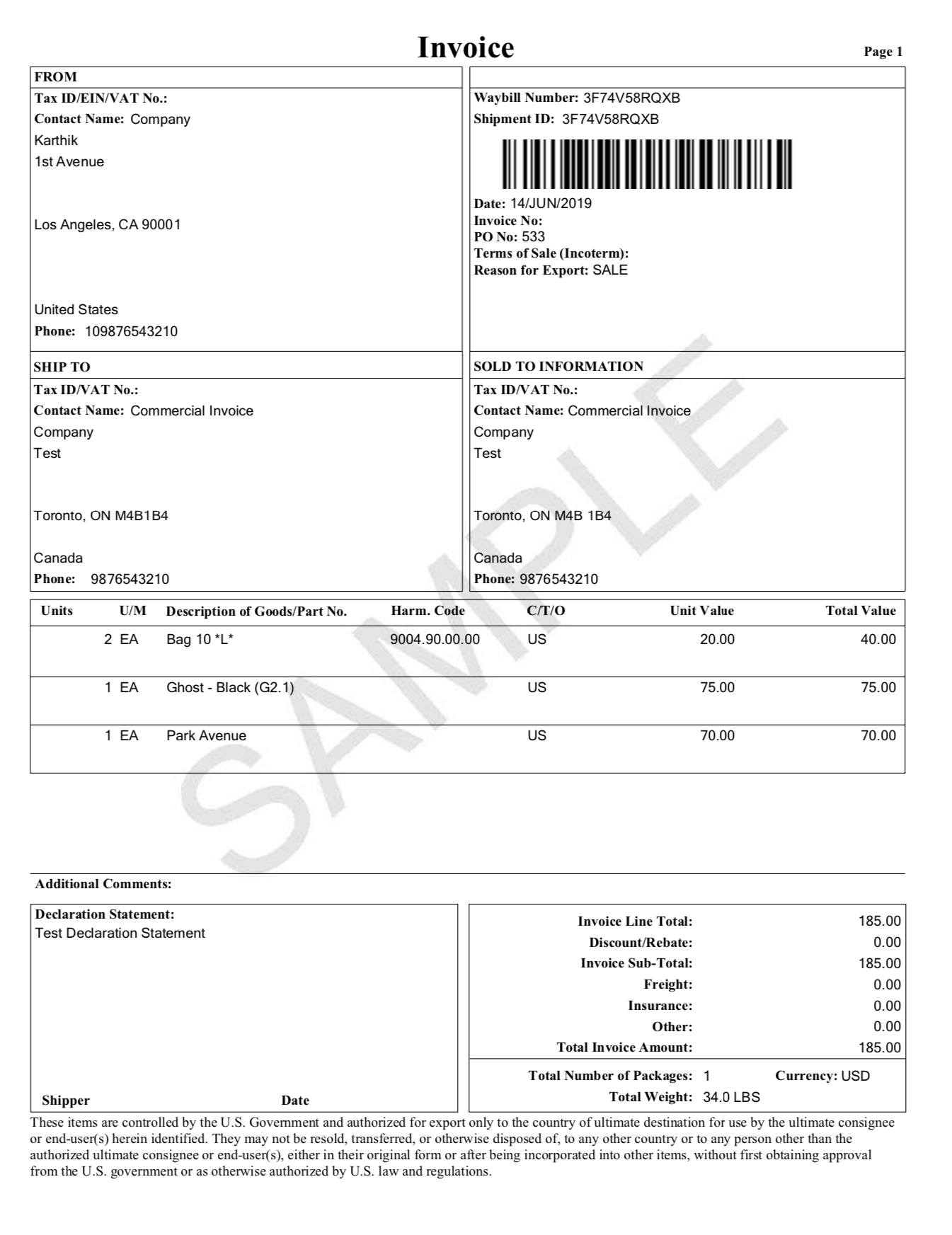In this guide, we will give you a few credible facts and information regarding UPS International Shipping. You’ll find the necessary information regarding parcels, customs, commercial invoices, shipping labels, insurance, and much more,
A quick thought of the top shipping carriers in the world, and UPS aces the list. They have been around for more than 100 years and their outstanding shipping facilities, tracking capabilities, package handling, and customer support, make them a solid choice for your business. When you talk international shipping, their UPS international shipping services are a delight, so much so that no other carrier comes even closer.
So how exactly did they manage to come to the top? Well, ever since UPS entered into the shipping game, they have constantly maintained their services to keep up to their promise of guaranteed and time-definite deliveries.
Secondly, they have always thrived to determine accurate delivery timings based on the shipment’s destination. Their exceptional customer service also played a massive role in providing amazing post-shipment support to its users.
So all-in-all, if you’re someone who is looking to ship items/orders internationally, then UPS is proven to be the right choice. This is why we decided to take up this topic and give you some insight into UPS international shipping. You can use this guide to choose the right service(s) for your business.
UPS international shipping – A quick overview
UPS goes way back when it comes to shipping. It was founded in the year 1907 which makes it even older than USPS and FedEx. But that doesn’t mean their shipping practices, logistics processes, or technologies are still old. Rather they are quite up to date, so much so that neither FedEx nor USPS could match their level as of now.
They’ve gained a lot of popularity and continue to thrive to date. Their unbeatable services offer a high level of security, speed, accuracy, and truly reliable delivery experience to both business owners and customers.
In fact, with the introduction of various robust APIs recently, most e-commerce store owners now prefer their in-house comprehensive shipment tracking and label printing system.
Coming back to the point, almost all of their international services deliver the package(s) within the time frame of 1-3 business days. And all of the services are protected by their money-back guarantee, which shows how serious they are.
Issues with UPS shipping
But all glory aside, one thing that may bug you, or even turn you off for that matter, is their shipping rates. When you compare the international shipping rates between DHL, FedEx, UPS, and USPS (the four major shipping services in the U.S.), you’d be disappointed as the prices are really up there.
Some users find their prices to be really high and thus, are usually reluctant to go further. Some of them instead go with USPS as their shipping rates are comparatively much cheaper.
However, users who go with other carriers like USPS often lose on the basic essential features like real-time shipment tracking, quick deliveries, and damage-free package handling.
It’s not like they don’t offer these features. It’s just that they don’t have a good track record when it comes to shipping. Many cases have been reported saying the customer received a damaged parcel, or the parcel was lost somewhere in the process (rarely).
These are just a few things that you should take into account if you ever plan on going with carriers like USPS.
How UPS international shipping services can help your business?
There are countless benefits to making your business global. You can reach out to more audiences, sell way more items, and ultimately develop brand recognition that is praised by fans all over the world.
If you’re solid on becoming big then you’re entitled to provide premium facilities to your customers. This, of course, calls for a better shipping experience which can only be met by offering shipping services from UPS.
UPS delivers packages and parcels to more than 220 countries with its UPS Worldwide Expedited. Based on your business model, you can choose the continents of your choice. Asia, for example, is the most populous continent and it’s a great destination for sellers worldwide. With internet-rich and high-demanding countries like India, China, Thailand, etc., you can sell a lot of products here.
Let’s take China as an example which is also one of the biggest importers of American-based products. Major leading eCommerce brands in the field of electronics and clothing ship tons of packages and parcels every single day. This translates to huge profits which further leads to the expansion of the business.
Europe is another great destination for many U.S. sellers. Some famous shipping carriers like UPS and FedEx ship their packages to various locations. But the problem with going with any of the private carriers is they cost a lot. You can check out the comparison between UPS vs USPS vs FedEx, and find out more.
Coming back to the topic, UPS offers much relatively decent deals compared to any other shipping carrier. The obvious here is that online businesses having more frequent visits to other countries would want to save money on shipping. This is why most businesses go for the international service provided by UPS.
UPS International Shipping Services
UPS has a good number of shipping services that cover almost all requirements. You can either choose to provide all the international services to your customers or just one based on your business requirement. But before you finalize the service(s), you should check out all of them. For example, some of the services work in fewer countries while there is some in more countries. So let’s explore all of them.
UPS Express Critical
UPS Express Critical is probably one of the fastest international shipping services provided by UPS. This service is available for time-critical shipments that require special handling and ultra-quick delivery.
Such services are vital to the healthcare, manufacturing, and aerospace sectors when the speed of delivery matters most. The delivery is attempted typically by 8:30 a.m. or 9:00 a.m.
In the United States, UPS Express Critical provides a large array of expedited services for the healthcare and life sciences industries including the transport of life-enhancing and life-saving tissue, biological specimens, and organs.
UPS Express Critical also partners with aerospace and manufacturing clients to ensure the timely delivery of parts that keep engines running, planes flying and production lines moving.
UPS Worldwide Express
With this service, you can send packages to over 135 countries and territories and receive packages from over 185 countries and territories. It is a guaranteed and time-definite service which means you get your money back if something happens.
Other features include in-house customs clearance and up to three delivery attempts made when your isn’t available. The delivery is attempted typically by 10:30 a.m. or 12:00 noon.
The guaranteed time- and day-definite delivery improvements include South and Central America, including Panama where customers can benefit from the Colón Free Trade Zone, plus Europe, the Middle East, and Africa, including Nigeria, the largest economy in Africa by GDP and population.
UPS also grew its express services footprint within key markets by adding new postal codes in 26 European countries, as well as in other high-growth markets such as South Korea, China, Hong Kong, Indonesia, and Singapore, all of which have exceeded annual per capita GDP growth of 3.5% for the last 50 years.
UPS Worldwide Express Plus
The package can reach your customers faster with the guaranteed and time-definite shipping service which is also protected by the money-back facility. This service allows packages to be sent to more than 55 countries and territories.
You can also receive packages from more than 190 countries and territories. You can rely on their door-to-door service with in-house customs clearance with up to three delivery attempts. The delivery is attempted typically by 8:30 a.m. or 9:00 a.m.
Companies that require spare parts quickly to keep operations running, and healthcare customers shipping emergency products rely on the speed and dependability of the service. With this latest expansion, the coverage area comprises nearly 90% of the global gross domestic product and nearly 90% of global real imports.
Expanding early morning delivery in Paris, London, and Milan will benefit luxury goods retailers that demand quick turnarounds between their design, sampling, production, and fulfillment cycles.
UPS Worldwide Saver
If you want to ship or deliver small items in a small package then the UPS Worldwide Saver Service is to go with. It’s also an economical way to ship packages to Canada by the end of the day of the next business day.
It takes about 2 business days to deliver a package to Mexico and major metropolitan areas worldwide. Apart from that, you also get day-definite delivery by the end of the business day to other locations worldwide, which again depends on the destination. Coming to other obvious features, you again get door-to-door service with in-house customs with up to three delivery attempts.
UPS Worldwide Saver offers 2 business day delivery to Europe and Latin America and 3 business days delivery to Asia for all packages (considering the origin is the United States). If you talk about the delivery timings, well, they usually deliver the packages by the end of the day if not early.
UPS Worldwide Expedited
For many obvious reasons, this is one of the most popular UPS international shipping services. You’re offered a guaranteed and day-definite delivery/service. And you are also protected by its money-back guarantee, so no problem there.
The good thing about this service is that you can send packages to over 220 countries and territories. Moreover, you can receive packages from over 80 countries and territories as well.
Other cool features about this service are that it offers door-to-door service with in-house customs clearance and up to three delivery attempts will be made. It can deliver packages to Canada within 2 business days and the delivery is usually attempted before the end of the day.
UPS Worldwide Express Freight
This international freight service is guaranteed and UPS promises to deliver the package(s) by end of the day or you get your money back. This includes a few non-door-to-door service options only for palletized shipments of more than 150 pounds.
With this service, you can send packages to over 65 countries and territories, and receive packages from over 70 countries and territories at the same time. Door-to-door service with in-house customs clearance is also provided along with this service.
UPS promises to deliver your freight parcels to most destinations within Europe on the next business day, 2business days to most destinations in the US and Canada, and two or three business days to locations in Asia.
UPS Worldwide Express Freight Midday
This is a rather new service and yet, is one the most affordable way of shipping large amounts of items internationally. this UPS international service is guaranteed and the delivery it a time-definite service. So if anything happens, you get your money back in the end.
You can send packages to over 35 countries and territories and receive packages from over 70 countries and territories as well. Other features include the door-to-door service with in-house customs clearance provided and Drop-off and Hold At Location options available in certain locations.
The highlight of this service is that the delivery timings are set on priority. So if you want the packages to be delivered by 12:00 noon or 2:00 p.m., then you should go with this Freight service. Of course, this does depend on the destination postal code and you need to make sure you can do that.
Which is the Cheapest UPS International Shipping Service?
Let’s face it, finding the right shipping price is the second biggest concern for any shipper, if not the first. If you charge too much, your customers would probably leave the Cart right away; and if you charge too less, you’re going to suffer.
All-in-all, in order to provide the best customer shopping experience without spending too much, it’s better to figure out the prices before you display rates on your website.
We know that researching UPS international rates online can feel overwhelming to you. There are just so many different services based on your delivery time frame and it can get really confusing sticking with just one.
So based on our analysis, the UPS Worldwide Express is probably the best one if you’re not into freight shipping. But if you want to look into freight shipping then the UPS Worldwide Express Freight is the one to go with.
Prices Calculated by Weight and Destination
The UPS International shipping prices are calculated based on the weight of the shipment and the country to which the parcel(s) is/are going to be shipped. You can use the International Price Calculator to calculate the expected shipping costs for international shipments. The rule remains the same for Canada and Mexico.
The WooCommerce Multiple Carrier Shipping plugin calculates the shipping rates in real-time and displays them on the Cart and Checkout pages.
When you think of comparing the international shipping charges between FedEx, UPS, and USPS then, yes, you have to do some digging. From our experience, we can say that FedEx and UPS don’t offer better deals when shipping items with USPS. The rates are much less than FedEx or UPS Ground but that comes with its fair share of issues as we said before in this article.
You can check out this article on, “What is the Cheapest Shipping Option for your WooCommerce-USPS, FedEx & UPS?” to know how it works out.
Restrictions with UPS international shipping
Shipping to other countries comes with a list of restrictions. If you don’t meet the requirements then you’re in for big trouble, and I’m pretty sure you wouldn’t want that. When it comes to UPS, the general rule for shipping items internationally is divided between items and packages. Let’s explore both of them and see what’s the real deal here.
Item Restrictions
What about shipping alcohol, beer, cigarettes, fruits, or vegetables? Yes, you may think these items are allowed but it’s not as simple. UPS has restricted some items for domestic and some for international shipments. And all prohibited domestic items are also prohibited from being shipped internationally.
However, some items that are prohibited from being shipped internationally can be shipped domestically (with some restrictions). Here’s a small list of domestic items that are prohibited,
- Airbags
- Ammunition
- Explosives
- Gasoline
- Marijuana (medical or otherwise)
Items prohibited for international shipments
- Aerosols
- Air Bags
- Alcoholic Beverages
- Ammunition
- Cigarettes
- Dry Ice
- Explosives
- Fresh Fruits and Vegetables
- Gasoline
- Marijuana (medical or otherwise)
- Nail Polish
- Perfumes (containing alcohol)
- Poison
Package Restrictions
The following boxes are available for most countries. You can find more about UPS boxes on its website. Here we will discuss some of them in detail.
- Letter
- PAK
- Tube
- 10 kg Box
- 25 kg Box
- Express Box
Letter
The UPS Letter is suitable for urgent correspondence and document delivery. As far as the dimensions and weight limitations are concerned, UPS Letter is 12.5″ x 9.5″ with a weight limit of 0.5 lbs.
Some other order information based on UPS Letters includes the number of parcels that should be there in a single order. UPS Letter packaging is valid for a minimum of 25 envelopes in a single order. The increment is possible for 25 more units but if the order contains more than 250 parcels, the increment value varies.
PAK
UPS PAK is used for protecting shipments that need a 16″ x 13″ x 1″ (or local equivalent) container of tear-resistant material. It is mostly used when the shipment has to be shipped with UPS Worldwide Express and UPS Worldwide Expedited services.
The dimensional limits for the packages shipped via UPS PAK are 17″ x 13″ x 1″. It is to be noted that the shipping cost that will be charged, will be based on the weight of the package. Also, in the case of UPS international shipping, all the export documentation is required in case you decide to pack your products in a UPS PAK.
Tube
The triangular Tube packaging is useful for shipping those documents that do not need to be folded. These documents can be rolled instead, and inserted into the tube. The tube packaging requires export documentation if the shipment is international. Otherwise, it can also be shipped domestically or in areas within the free circulation.
The dimensions of tube packaging are about 38″x 6″ x 6″, with no weight limits. Further, no order details or increment quantity is available in the case of the tube packaging.
UPS 10kg Box
The UPS 10kg box is very useful for the UPS Worldwide Express service. It is used to parcel documents across the countries and as the name suggests it can contain a package weighing not more than 10kg. Since this is an internationally shipped delivery box, it is mandatory to include export documentation with it. Moreover, the charges are calculated based on the flat rate and the shipping zone.
As far as the dimensions are concerned, the dimensions of this box are 16″ x 13″ x 10″, with a weight limit of 10kg. Besides, the order should contain a minimum of 2 such 10kg UPS boxes and the same goes for the increment. But the orders containing more than 5 boxes may have different increments.
UPS 25kg Box
UPS International shipping also provides a bigger option to deliver orders to customers. The 25kg shipping package is suitable for those orders which exceed the minimum limit of a 10 kg UPS box. And hence, instead of using two such boxes, store owners can pack the whole package in one bigger box.
Just like the 10kg Box, this one too supports UPS Worldwide Express service, with export documentation mandatory. Also, the charges are based on flat rate charges and shipping zones.
The dimensions of this box are 19″ x 17″ x 14″, with a weight limit of 25kg. The minimum quantity based on a single order is again two boxes per order. But it may vary if the total package exceeds five such boxes.
Express Box
The UPS shipping boxes also have an Express Box option for domestic as well as UPS international shipping. The Express Box ships through almost all UPS international shipping services. Other than that, the Express Boxes are used for a wide range of shipping, which makes them very versatile. The shipping charges are calculated on the basis of the weight of the package or the shipping zone.
When it comes to the dimensions of the Express Box, there are three options available.
- Large Express Box (dimensions 18″ x 13″ x 2″ )
- Medium Express Box (dimensions 16″ x 11″ x 2″ )
- Small Express Box (dimensions 13″ x 11″ x 2″ )
Shipment tracking with UPS international shipping
No matter, if it’s domestic or international shipping, order/shipment tracking, plays an important role in determining the level of customer satisfaction. Most successful businesses that you see have an exceptional customer satisfaction rating. Amazon, for example, offers exceptional order tracking features which many people like. And it clearly shows how important tracking is for them.
USPS offers an amazing and outstanding tracking experience. If you’re looking to establish a big and strong eCommerce website then UPS is the one you go for.
A typical tracking procedure in the case of UPS requires a lot of manual effort and time. First of all, you need to generate a package so that you can get the shipping label along with the tracking IDs. This procedure takes a lot of time as you have to enter the details of every package for all the orders.
Once you successfully generate your packages you will get the official UPS shipping labels along with the tracking IDs for all your orders. In order to track your packages, you are then required to enter all the tracking IDs on the UPS website. Then only you will be able to check the whereabouts of your packages.
Insurance for your UPS packages
It is clear from the above section that UPS provides $100 insurance per package. However, if the package is worth more than $100, store owners can declare that amount and send it to UPS. This option to send some declared value is not free-of-cost. UPS charges a small amount from its customers to have this option on their UPS Account.
Once done, all store owners have to do is mention the declared amount while selling it and then send it to UPS. We will be discussing it in detail in the following section.
WooCommerce UPS Shipping plugin is a shipping solution for WooCommerce shop owners. It provides almost all the necessary features that are required for a smooth shipping process. Using this plugin, store owners can,
- Get real-time accurate shipping rates
- Pack products based on weight and custom dimensions
- Get shipping labels along with the return shipping label
- Track shipment across the globe
Besides all these features, there is another feature that most of the store owners require making sure their money is safe.
Custom Declared Value
One of the points worth noticing in the UPS Insurance policy is that if the value of the shipment is more than $100, the insurance will be based on the declared value. However, the declared value must also satisfy some conditions.
UPS doesn’t add insurance (cost of selling the package) and instead, it only accepts the cost of replacing, repairing, or purchasing the package in case of any mishappening. By providing the custom-declared value, store owners can provide an amount that satisfies all these conditions.
WooCommerce UPS Shipping plugin serves that purpose very well by providing the declared value option for every product. Using that option store owners can set a declared value on the product edit page.
Even though UPS provides insurance, there are a few restrictions. For instance, UPS does not offer insurance on the following items:
- Coins, Banknotes, Currency notes (including paper money)
- Securities of any kind payable to the bearer
- Traveler’s checks
- Platinum, Gold, and silver
- Precious stones
- Jewelry
- Watches and other valuable articles (however, for these items, you can purchase additional merchandise insurance)
Commercial invoice
Clearing customs is yet another task when it comes to UPS international shipping. If you don’t have the right papers and documents ready with your shipments then your package(s) might get stuck on a foreign airport. So it’s better if you clear everything beforehand to avoid such issues.

A commercial invoice form is used for all shipments containing non-documents. The commercial invoice is the primary document used for importation control, valuation, and duty determination. This document identifies the products being shipped.
The form should include:
- Complete name and address information for both shipper and consignee
- Phone numbers for both shipper and consignee
- Terms of Sale (Incoterm)
- Reason for export
- A complete description of the item
- What is the item?
- What is the item used for?
- Harmonized Tariff Codes, if known
- Country or territory of origin (where manufactured) for each commodity
- Number of units, unit value, and total value (purchase price) of each item
- Number of packages and total weight
- Shipper’s signature and date
The WooCommerce UPS shipping plugin allows you to set up the commercial invoice form right in the plugin settings. Have a look at the following image.

Generating and downloading the shipping labels
Well, the WooCommerce UPS Shipping plugin not only helps in generating the shipping label but it also helps the store owners to download the shipping labels. This way the store owners can use the shipping label and fulfill their orders.
Once you have successfully generated the shipping label, you need to select the order you want to get the shipping label and click on the option to print it. The image below shows a sample shipping label for UPS Worldwide Expedited.

And the shipping label will be downloaded as a PNG file. You can download it using any printer. The image below shows the UPS Shipping Lable printed using the plugin.
Conclusion
The UPS is hands down, the best delivery/shipping service option for companies that ship small items. It provides the best UPS international shipping deals for packages in all shapes and sizes. If you’re shipping products out of your country, you should use UPS and nothing else if you want to provide a true shopping experience to your customers.
All UPS international services by UPS are amazing. And you should consider using any one of them if you especially want to deliver items out of the United States. The delivery timings are really prompt and so it the shipment tracking.
The WooCommerce UPS Shipping plugin comes with features like automating real-time shipping rates, printing UPS shipping labels, support for domestic, international and freight shipments, live tracking for your shipments, and multi-vendor support which can help you streamline UPS international shipping for your store.
I hope you liked the article. You can let me know your thoughts in the comments below. If you have any issue or help in setting up shipping on your WooCommerce store then feel free to contact our customer support. They should be able to help you out.
Happy selling!




